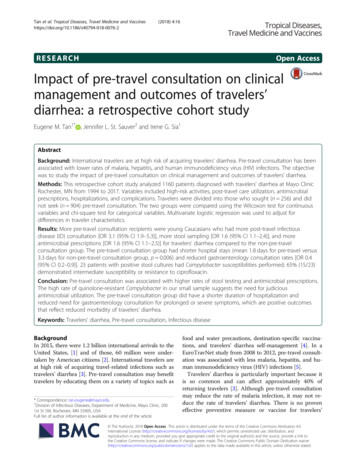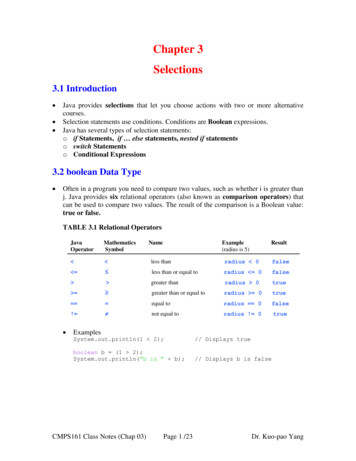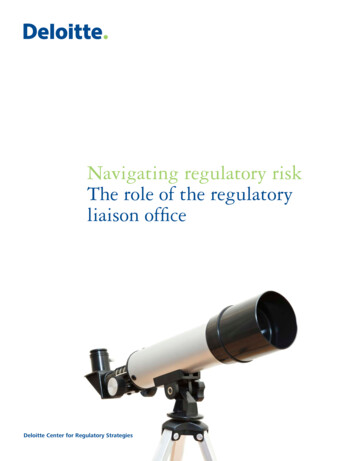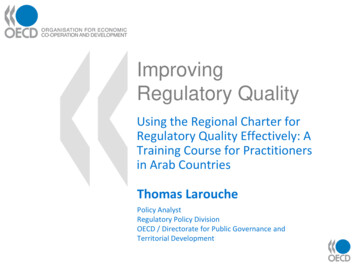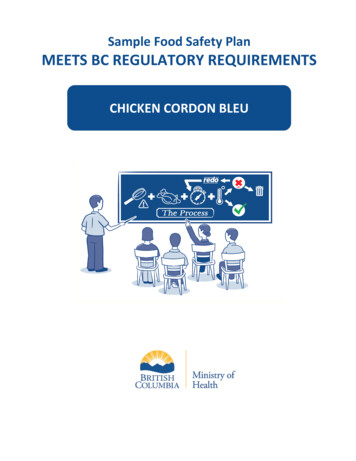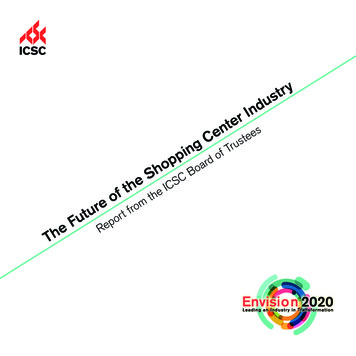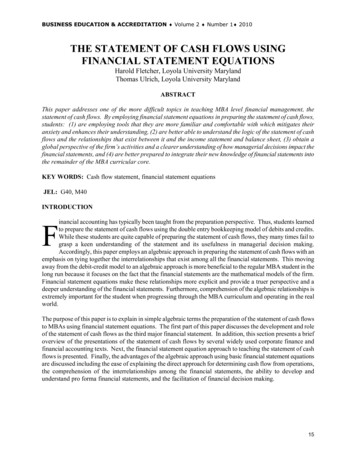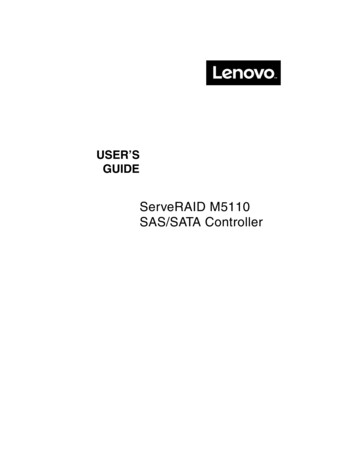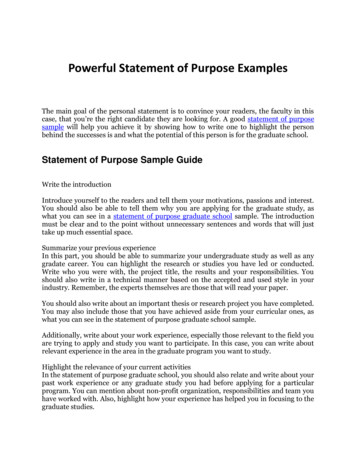
Transcription
Consultation Regulatory Impact StatementPublic Health Amendment(Immunisation Requirements for Enrolment) Bill2019Strengthening immunisation requirements for enrolment into childcare services and kindergarten programs in Western AustraliaPublic Health Act 2016 (WA)School Education Act 1999 (WA)March 2019
CRIS: Public Health Amendment (Immunisation Requirements for Enrolment) Bill 2019This paper was prepared by:Communicable Disease Control Directorate (CDCD)Public and Aboriginal Health Division (PAHD)Department of Health, Western Australia189 Royal StreetEast Perth WA 6008PO Box 8172Perth Business Centre WA 6849Tel:(08) 9222 2486Email: immunisation@health.wa.gov.auWeb: www.health.wa.gov.auProject Managers: Dr Paul Effler, Medical Advisor, CDCD, PAHDProject Team: Robyn Gibbs, Manager, CDCD, PAHDGeorgiana Lilley, Senior Policy & Planning Officer, CDCD, PAHDAcknowledgements: Paul Armstrong, Department of HealthCarolien Giele, Department of HealthBarry Combs, Department of HealthKellie Mitchell, Department of HealthByron Minas, Department of HealthChloe Thomson, Department of HealthPrudence Myers, Department of HealthKate Colleran, Department of the Premier and CabinetGraham Wimbridge, Department of EducationVicki Kelly, Department of CommunitiesAngela Hayward, Department of CommunitiesDisclaimerThe views expressed in this document may not, in any circumstances, be interpreted as statingan official position of the Department of Health.This document is intended to serve as the basis for further discussion with interestedstakeholders.1
CRIS: Public Health Amendment (Immunisation Requirements for Enrolment) Bill 2019ContentsInvitation to Make a Submission . 41Executive Summary . 52Aim . 73Introduction . 73.1 Proposed No Jab No Play policy in WA . 74Statement of the public health issue . 94.1 Cases of vaccine-preventable diseases in WA . 94.2 Immunisation rates in WA . 114.3 Factors contributing towards low immunisation rates . 184.4 Need for additional immunisation regulation and promoting equity . 195Immunisation in Western Australia . 205.1 National Partnership on Essential Vaccines . 215.2 Commonwealth program: No Jab No Pay . 225.3 WA Immunisation Strategy 2016-2020 . 225.4 Immunisation regulation in WA . 236Immunisation regulation in other jurisdictions: No Jab No Play . 257Proposals for strengthening immunisation regulation . 317.1 Option A: Fully implement recently introduced regulations . 317.2 Option B: Amend the Public Health Act 2016 . 348Option B: Proposed legislative changes for Western Australia . 378.1 Proposal 1 – Require, with rare exception, a child’s immunisation status to be ‘up to date’ as a condition ofenrolment into child care services and kindergarten programs . 388.2 Proposal 2 – In specified circumstances, allow for documentation other than a child’s AIR ImmunisationHistory Statement to be used to satisfy immunisation requirements for enrolment into child care servicesand kindergarten programs . 418.3 Proposal 3 – Prescribe the categories of children for which exemptions to immunisation requirements forenrolment into child care services and kindergarten programs apply . 448.4 Proposal 4 – Enable updated information about a child’s immunisation status to be provided at times otherthan enrolment . 498.5 Proposal 5 – Offences for which penalties may be issued . 518.6 Proposal 6 – Minor technical amendments to the Public Health Act 2016 . 538.7 Proposal 7 – Consequential amendments to other legislation . 549Consultation . 5510Implementation . 5711Evaluation . 5711.1 Monitor immunisation rates and notifications of VPDs. 5711.2 Monitor impacts. 5811.3 Statutory review . 5812Acronyms . 592
CRIS: Public Health Amendment (Immunisation Requirements for Enrolment) Bill 20193
CRIS: Public Health Amendment (Immunisation Requirements for Enrolment) Bill 2019Invitation to Make a SubmissionThe Department of Health (DoH) is undertaking a public consultation on the Public HealthAmendment (Immunisation Requirements for Enrolment) Bill 2019 (‘the Bill’), which proposesthat, with rare exception, children in Western Australia (WA) need to be fully vaccinated for ageas a condition of enrolment into child care services, community kindergartens and schools,before the compulsory education period. This Consultation Regulatory Impact Statement (CRIS)should be read alongside the Bill, as it outlines the public health issue the Bill is addressing,provides background information to the development of the immunisation policy itself,investigates the experience of similar legislation in other Australian jurisdictions, and exploreseach of the Bill’s proposals in terms of anticipated impacts to the early education and careindustry, families and the State Government.Guiding QuestionsYou are invited to participate in this public consultation by responding to the Guiding Questionsunder the Options and the Proposals. The Guiding Questions facilitate the consultation processby providing a framework for submissions. You do not have to respond to all questions, andinstead you may prefer to respond to only those questions that are relevant to you.In providing your response, please explain the reasons behind your comments and wherepossible provide evidence to support your views e.g. statistics, publications, examples.How to Make a a.gov.au/Complete the Guiding Questions and email to:immunisation@health.wa.gov.auComplete the Guiding Questions and post to:Immunisation ConsultationCommunicable Disease Control DirectoratePostPublic and Aboriginal Health DivisionDepartment of HealthPO Box 8172Perth Business Centre WA 6849You can also provide kontheBillbyemailing:Closing DateThe closing date for submissions is 26 March 2019 at 5pm (WST).4
CRIS: Public Health Amendment (Immunisation Requirements for Enrolment) Bill 20191Executive SummaryThe Western Australian (WA) Government is proposing that immunisation requirements forchildren enrolling into child care services, community kindergartens, and schools, before thecompulsory education period, are strengthened through the Public Health Amendment(Immunisation Requirements for Enrolment) Bill 2019 (‘the Bill’). A public consultation on this Billis currently being undertaken by the Department of Health (DoH), seeking stakeholder feedbackon the seven proposals contained in the Bill.Although the immunisations recommended in the Australian childhood immunisation scheduleare provided at no cost under the National Immunisation Program1 (NIP), and the DoH’simmunisation program continues to deliver diverse initiatives which aim to increase access toimmunisation services across the state under the WA Immunisation Strategy 2016-20202,according to data in the Australian Immunisation Register (AIR), WA has lower childhoodimmunisation rates compared to other jurisdictions, and continues to experience the ongoingincidence of vaccine-preventable notifiable infectious diseases (VPDs).At least 95% of children should be fully immunised to effectively prevent outbreaks of highlyinfectious diseases like measles, which is also life threatening. Known as herd immunity, the95% immunisation rate is important to protect others in our community, including those who aretoo young to be vaccinated and those who are unable to be vaccinated for medical reasons,including pregnant women, children with immune disorders and some cancer patients.The WA Government is currently investigating the introduction of additional legislation intendedto increase childhood immunisation rates, for which there are two options: Option A – Fully implement recently introduced regulations requiring the collection andreporting of immunisation information by child care services, community kindergartensand schools at the time of enrolment, and monitor any impact before changing the statusquo.3 Option B – Amend the Public Health Act 2016 (WA) (‘the Act’) to require, with rareexception, children in WA to be fully vaccinated for age as a condition of enrolment intochild care services, community kindergartens and schools, before the compulsoryeducation period.Option A refers to regulations which came into effect in January 2019 under the Public HealthAct 2016 (WA) which mandate universal immunisation records checks for children when theyenrol into a child care service, community kindergarten and school, and allow the Chief HealthOfficer (CHO) to request reports on the immunisation status of any child or children enrolled.4Families of under-vaccinated children who are reported to the DoH under the regulations will beoffered assistance with obtaining vaccinations but there is no exclusion of these children from1National Immunisation Program; Department of Health, Commonwealth of Australia. Available rams/national-immunisation-program2Western Australian Immunisation Strategy; Department of Health, Government of Western Australia. Available at:https://ww2.health.wa.gov.au/Articles/F I/Immunisation-strategy-20163Immunisation enrolment requirements for child care services, kindergarten and schools; Department of Health,Government of Western Australia. Available at: 4Immunisation enrolment requirements for child care services, kindergarten and schools; Department of Health,Government of Western Australia. Available at: 5
CRIS: Public Health Amendment (Immunisation Requirements for Enrolment) Bill 2019attending or enrolling into a child care service, community kindergarten or school, before thechild’s compulsory education period.Option B would introduce immunisation enrolment requirements for non-compulsory earlyeducation and child care services, similar to policies already implemented in Victoria and NewSouth Wales, referred to colloquially as “No Jab No Play” (NJNP; see Section 6).At the Premier’s direction, an interagency working group comprising representatives from theDepartments of Health (DoH), Education (DoE), Communities (DoC) and the Premier andCabinet (DPC) have worked together to develop legislation to progress Option B. The keycomponents of the proposed Bill are reflected in the following seven Proposals listed below. Inaccordance with the Regulatory Impact Assessment (RIA) process,5 this public consultation isseeking feedback on these Proposals as outlined within this Consultation Regulatory ImpactStatement (CRIS):Proposal 1 – Require, with rare exception, a child’s immunisation status to be ‘up to date’ asa condition of enrolment into child care services and kindergarten programsProposal 2 – In specified circumstances, allow for documentation other than a child’s AIRImmunisation History Statement to be used to satisfy immunisationrequirements for enrolment into child care services and kindergarten programsProposal 3 – Prescribe the categories of children for which exemptions to immunisationrequirements for enrolment into child care services and kindergarten programsapplyProposal 4 – Enable updated information about a child’s immunisation status to be providedat times other than enrolmentProposal 5 – Offences for which penalties may be issuedProposal 6 – Minor technical amendments to the Public Health Act 2016Proposal 7 – Consequential amendments to other legislationAmendments to the School Education Act 1999 (WA) are also required, to provide consistencyand to complement the proposed amendments to the Act. These amendments are beingaddressed simultaneously in the Bill.To support implementation of the Bill, various matters are also required to be prescribed inregulation. The proposed content of these regulations is also detailed under the relevantProposal later in this document. Minor consequential amendments are also required to thePublic Health Regulations 2017, School Education Regulations 2000 and Child Care Services(Child Care) Regulations 2006. At a later stage in 2019, consequential amendments to theEducation and Care Services National Regulations 2012 (WA) will also be introduced.5Regulatory Impact Assessment Guidelines for Western Australia; Regulatory Gatekeeping Unit (now known asthe Better Regulation Unit); Department of Treasury and Finance, Government of Western Australia; updated July2010. Available at: ontent/Economic Reform/RIA Program/ria guidelines.pdf6
CRIS: Public Health Amendment (Immunisation Requirements for Enrolment) Bill 20192AimThis CRIS outlines the public health issue to be addressed, the current provision of childhoodimmunisation programs in WA under the NIP, the newly introduced immunisation-relatedregulations, and the experience of the implementation of similar No Jab No Play legislation inother Australian jurisdictions.Two feasible and practical options to improve WA’s childhood immunisation rates arepresented, however it is the seven Proposals which constitute Option B that encompass theGovernment’s preferred policy. This CRIS explains the Proposals and should be read alongsidethe Bill to aid participation in the public consultation.3IntroductionIn September 2017, Premier McGowan directed that WA should introduce immunisationrequirements for children enrolling in child care services and kindergarten programs in WA.Amendments are proposed to the Act to require that, with rare exception, children in WA needto be fully vaccinated for age as a condition of enrolment into child care services, communitykindergartens, and schools, before the compulsory education period, unless the child has anapproved medical exemption, is on an approved catch-up schedule, or is identified as beingvulnerable and/or disadvantaged under prescribed exemption categories. Queensland, Victoriaand New South Wales have already introduced legislation with similar underlying policyobjectives, and South Australia is planning to do so in the near future.Immunisation is a safe and effective way of protecting individuals against serious infectiousdisease.6 Immunisation not only protects individuals from life-threatening diseases, but can alsoreduce the spread of disease within a community, a phenomena often referred to as indirectprotection or ‘herd immunity.’ The higher the proportion of people who are immune to a diseasethrough vaccination, the fewer opportunities a disease has to spread.6 Creating ‘herd immunity’is important for protecting individuals who cannot be directly immunised themselves, oftenbecause they are too young to receive the vaccine or because they have a medical contraindication.3.1Proposed No Jab No Play policy in WAA working group consisting of representatives from the DPC, DoH, DoE, and DoC developed anapproach for implementing a No Jab No Play (NJNP) policy in WA (see Table 1).Table 1Approach to strengthening immunisation enrolment requirements for children in WANo Jab No Play in WA - subject to the current public consultationDescription Introduce the proposed Bill to require that, with rare exception, children in WA are fully vaccinated for age as acondition of enrolment into child care services, community kindergartens and schools, before the compulsoryeducation period commences. In most instances, in order to enrol, a child’s immunisation status will be required to be recorded as ‘up to date’on an AIR Immunisation History Statement issued within 2 months of the proposed enrolment. Children with an approved medical exemption to a vaccine or natural immunity to a specific disease are ‘up todate’ for the relevant vaccine according to their AIR Immunisation History Statement.6National Immunisation Program; Department of Health, Commonwealth of Australia. Available rams/national-immunisation-program7
CRIS: Public Health Amendment (Immunisation Requirements for Enrolment) Bill 2019No Jab No Play in WA - subject to the current public consultation Exemptions to the child care and kindergarten immunisation requirements will apply to children who are:-on an approved immunisation catch-up schedule; or-identified as being an exempt child. This proposed WA NJNP immunisation policy acknowledges the importance of access to early education asenunciated in the 2018-2019 National Partnership Agreement on Universal Access to Early Childhood7Education. Early education services can be particularly important for vulnerable and disadvantaged children,who should be supported to ensure their participation in early education services. It is proposed that under thispolicy vulnerable and disadvantaged children who are under-vaccinated will be exempt from the requirement tobe fully vaccinated for age, as a condition of enrolment into child care services and kindergarten programs. Under-vaccinated children who are enrolled in child care services, community kindergartens and schools, beforecompulsory education period, on an exemption, and children who are enrolled on an approved immunisationcatch-up schedule, will be reported to the DoH. The DoH will follow up with the families of these under-vaccinated children to provide support in accessing localimmunisation services.Legislative changes for the proposed NJNP policy in WA are being progressed in accordancewith the RIA process, and under the guidance of the Better Regulation Unit. The RIA processensures that any proposed new regulation is efficient and effective, and addresses a clear andidentifiable public health issue within the community. The RIA process also provides assuranceto government and stakeholders that a rigorous and transparent assessment of the impacts hasbeen carried out, and that effective and appropriate consultation has taken place. As theproposals within the WA NJNP policy are likely to have an impact on the early education andchild care industry, families and the State Government, this CRIS has been developed andreleased alongside the Bill, in accordance with the RIA process. The primary purpose of thisCRIS is to facilitate public comment on the options and proposals, and their potential impacts, soas to enable Government to form a balanced and evidenced-based view on the best way toproceed.The purpose of the proposed amendments to the Public Health Act 2016 and School EducationAct 1999 is to mitigate the risk of VPDs occurring among children attending child care services,community kindergartens, schools and the wider community, by ensuring that, with rareexception, all children enrolled in these services are fully vaccinated for their age. The proposedlegislative changes will not apply to compulsory schooling which commences with pre-primaryschool in WA.The rationale for the immunisation policy is that, if young children do not receive theirrecommended vaccinations, they are at increased risk of serious illness. If a substantial numberof children are unvaccinated, there is an increased risk of VPDs spreading within early educationand care settings, and potentially, the wider community. While the Commonwealth’s existing NoJab No Pay scheme aims to achieve high immunisation rates among children attending childcare services, for children who do not attend a child care service, kindergarten programs areusually their first entry point into early education and care and the broader school system. In thisregard, enrolment into kindergarten programs offer an additional check point, occurring at acritical age for a child to receive the recommended vaccinations on the NIP’s childhood schedule(birth to four years). This policy aims to promote the recommendations of the childhood72018-2019 National Partnership on Universal Access to Early Education, Department of Education and Training,Commonwealth Government. Available at: agreements8
CRIS: Public Health Amendment (Immunisation Requirements for Enrolment) Bill 2019schedule, by ensuring that by the time children reach kindergarten or during the year they turn 4,they have completed their childhood immunisation schedule.The new immunisation requirements will apply to children enrolling in a child care service (otherthan a child care service that operates on a temporary, casual or ad hoc basis). It will also applyto enrolments in a pre-kindergarten program and kindergarten program in a government school,non-government school or community kindergarten (see Table 2). Community kindergartens, ofwhich there are approximately 24 currently operating in WA, are typically run by a parentmanagement committee, operate in standalone facilities, and are linked to local public schools.8Table 2Definition of early education and care services for which the proposed No Jab No Playlegislation will apply in WAServices includedServices excluded Child care services which are: Child care services which are:-centre-based care-occasional care services-long day care-ad hoc child care e.g. crèches-family day care-vacation care; or-outside school hours care Community kindergartens Government and non-government schools:4-pre-kindergarten programs-kindergarten programsStatement of the public health issueDespite all efforts to achieve and maintain immunisation rates of 95% and above, which is theaspirational target and considered necessary to achieve ‘herd immunity’ for a highly infectiousdisease like measles, immunisation coverage among WA children remains lower than otherAustralian jurisdictions,9 and outbreaks of VPDs continue to occur in WA.4.1Cases of vaccine-preventable diseases in WAVaccine-preventable disease (VPD) continues to occur within the WA population (see Table 3).The number of disease notifications is monitored by the Communicable Disease ControlDirectorate (CDCD), DoH. Children under five years have some of the highest disease rates fora number of VPDs. Individuals who are not fully immunised are at risk of acquiring VPDs andtransmitting them to others individuals, including those who cannot be immunised for medicalreasons, and those who are too young to receive certain vaccines. Immunisation helps toprevent individuals from acquiring VPDs, and also helps to protect other members of thepopulation by reducing exposure to disease.8Community Kindergartens Association WA, Community Kindergartens Association WA. Available at:http://www.cka.asn.au/9Immunisation coverage rates for all children; Department of Health, Commonwealth Government; accessed 3December 2012 at: verage-rates-for-all-children9
CRIS: Public Health Amendment (Immunisation Requirements for Enrolment) Bill 2019Table 3Number of notifications of selected vaccine-preventable diseases in WA by year, 83611692647Pertussis (whoppingcough)Pneumococcal infectionRubellaVaricella (chicken pox)Note: Data sourced from the Immunisation, Surveillance and Disease Control Program, Communicable Disease ControlDirectorate, Department of Health WA.Pertussis is the most commonly notified VPD in WA. From 2016 to 2018, the notification ratewas highest in those aged 14 years or younger (average: 110 per 100,000 population), althoughthe rate among this age group decreased by 34% from 2017 to 2018 (131 to 81 per 100,000population).The annual number of mumps cases is generally low in WA, but in 2015 and 2016 there was anoutbreak of mumps amongst young Aboriginal people living in the remote regions of WA. Overthe five year period from 2014 to 2018, the highest number of cases were in adolescents aged15 to 19 years (187 cases, 19%), followed by children aged 10 to 14 years (160 cases, 16%).There were 973 cases of invasive pneumococcal disease notified from 2014 to 2018, withchildren aged less than 14 years comprising 18% of cases. During this time period, 888 (91%)of the cases were hospitalised, and 103 (11%) died. The majority of the cases presented withpneumonia (65%) or bacteraemia (31%), with a smaller number presenting with meningitis(7%).There were 140 cases of invasive meningococcal disease (IPD) cases from 2014 to 2018.Children under five years old comprised 45% (18 cases) of all meningococcal notifications in2018. The notification rate for this age group was seven-times higher than the overall rate thatyear (9.7 and 1.4 per 100,000 respectively). There were no deaths caused by meningococcaldisease during 2018. The number of meningococcal notifications increased from 2016 to 2018due to an increase in the number of serogroup W cases. Half of all meningococcal W cases in2018 were in children aged less than 5 years of age. In 2018, WA introduced a program toprovide free meningococcal ACWY vaccination to children less than 5 years of age, followingwhich the meningococcal ACWY vaccination became part of the NIP in July 2018.10
CRIS: Public Health Amendment (Immunisation Requirements for Enrolment) Bill 2019Measles cases notified in WA from 2014 to 2018 were associated with importations fromoverseas (49%) and subsequent local transmissions (50%). The age groups with the highestnumber of measles cases were children under 5 years (16 cases), teenagers 15 to 19 years (15cases), and adults aged 20 to 39 years (62 cases). All of the young children infected withmeasles had not received a measles vaccination.4.2Immunisation rates in WAAt least 95% of children should be fully immunised to effectively prevent outbreaks of a highlyinfectious disease like measles. Achieving a 95% immunisation rate (called ‘herd immunity’) isimportant to protect members of our community that are too young to be vaccinated and thosewho are unable to be vaccinated for medical reasons, including pregnant women, children withimmune disorders and some cancer patients.Immunisation coverage is monitored by the Federal Government’s Australian ImmunisationRegister (AIR) which is a national database of vaccinations administered to individuals. AIRproduc
(Immunisation Requirements for Enrolment) Bill 2019 ('the Bill'). A public consultation on this Bill is currently being undertaken by the Department of Health (DoH), seeking stakeholder feedback on the seven proposals contained in the Bill. Although the immunisations recommended in the Australian childhood immunisation schedule
